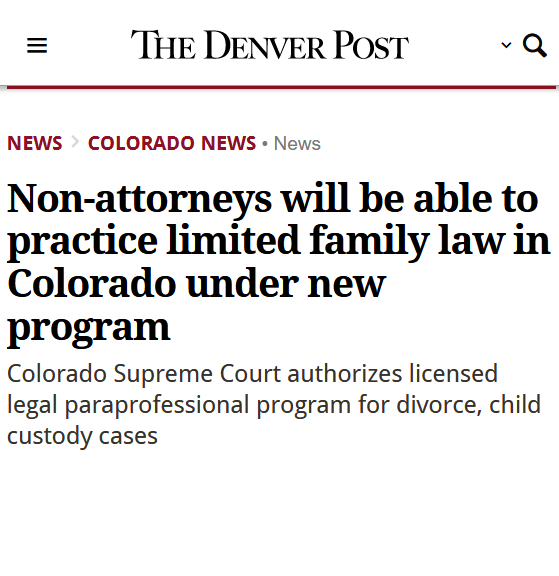
The Colorado Supreme Court on March 27th approved a new rule allowing licensed legal paraprofessionals (LLPs) to practice limited forms of law related to some family and child-custody matters. The new rule 207 of the Colorado Rules of Civil Procedure will take effect July 1st.
Proponents say the change will help make legal representation more affordable for people involved in domestic relations cases such as divorce and allocation of parental responsibility or custody.
Requirements
Legal paraprofessionals must obtain a license by passing a written exam administered by the Office of Attorney Regulation Counsel. Before taking the exam, applicants must complete 1,500 hours of substantive law-related practical experience, including 500 hours of experience in Colorado family law, within the three years immediately preceding the date of the examination.
Applicants also will have to pass an ethics class, a professional conduct exam, and complete continuing legal education requirements, according to the Court’s press release. They will be subject to a complaint and discipline process similar to what licensed attorneys face in the state.
Under the rule, LLPs may complete and file standard pleadings, and represent their clients in mediation. They also may accompany their clients to court and answer a court’s factual questions, though they may not present oral argument or examine witnesses in a hearing.
The new rule is important for Colorado private investigators as we often work alongside legal professionals. Understanding the scope of work of legal paraprofessionals can perform is useful when providing investigative support to child custody cases or other civil litigation related to family matters. It’s also good to know for general compliance and working within the law.
What it means for Colorado Private Investigators
LLPs may also become important contacts for referrals or possibly even a new potential market for Colorado private investigators. It will be interesting to see if those who pursue licensure will work for larger law firms or start their own specialized firms. Of course, Ross Investigators, PC, is highly experienced in supporting a wide variety of family-related civil claims and litigation. Background checks of new partners/boyfriends/girlfriends, surveillance, and evidence gathering are all common ways private investigators may be able to support those law professionals that pursue this type of licensing. It’s also possible that many people who may not have previously pursued legal action may now consider it if they can get good lower cost representation.
With the adoption of the new rule, Colorado becomes one of five states that issue some form of limited license for non-lawyers to practice law. The other four states are Arizona, Minnesota, Oregon, and Utah. Washington and California both developed limited-license programs, but neither is actively licensing non-lawyers, according to the American Bar Association.
The Court says it expects the first LLPs will be able to receive their licenses in July 2024. The entire rule is available for viewing at https://www.courts.state.co.us/userfiles/file/Court_Probation/Supreme_Court/Rule_Changes/2023/Rule%20Change%202023(06).pdf.
What do you think, will this new rule have an effect on family-related cases?
Leave a Reply